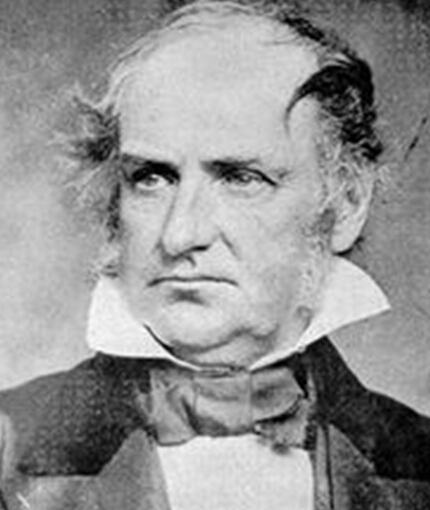

Edward Dickinson Baker (February 24, 1811 – October 21, 1861) was an English-born American politician, lawyer, and military leader. In his political career, Baker served in the U.S. House of Representatives from Illinois and later as a U.S. Senator from Oregon. A long-time close friend of U.S. President Abraham Lincoln, Baker served as U.S. Army colonel during both the Mexican-American War and the American Civil War. Baker was killed in theBattle of Ball's Bluff while leading a Union Army regiment, becoming the only sitting senator to be killed in the Civil War.
Death of Colonel Edward D. Baker at the Battle of Ball's Bluff, October 21, 1861.
The Civil War began April 12 when Confederate artillery fired on Fort Sumter, and three days later, President Lincoln called for 75,000 volunteers. Baker left the Senate to go to New York City, where he spoke for two hours to a crowd of 100,000 in Union Square on April 19. He was blunt: “The hour for conciliation is past; the gathering for battle is at hand, and the country requires that every man shall do his duty.” He affirmed his own willingness to take up arms: “If Providence shall will it, this feeble hand shall draw a sword, never yet dishonored, not to fight for honor on a foreign field, but for country, for home, for law, for government, for Constitution, for right, for freedom, for humanity.” The following day, he met with 200 men from California who wanted to form a regiment that would symbolize the commitment of the West Coast to the Union cause. On May 8, Baker was authorized by Secretary of War Simon Cameron to form the California Regiment with him as its commanding officer with the rank of colonel.
Baker telegraphed Isaac J. Wistar, his San Francisco law partner, who was back in Philadelphia, and asked him to help recruit and organize the regiment. When Wistar asked about rank, Baker replied, “I cannot at this moment accept military rank without jeopardizing my seat in the Senate. But you know my relations with Lincoln, and if you do that for me, I can assure you that within six months I shall be a Major-General and you shall have a Brigadier-General’s commission and a satisfactory command under me.” Baker wrote to Lincoln on June 11, asking that he be given a command that would “not make him second to everybody.” His efforts paid off; on July 31, Lincoln sent the Senate names of men he was recommending for appointments as brigadier generals. On the list, besides Charles Stone, Ulysses Grant and others, was Edward Baker.
He told the Senate he would refuse the commission because of its doubtful legality. He said he was pleased that the government would allow him a command with his rank of colonel, “quite sufficient for all my military aspirations,” which indicates he believed he could be a colonel and remain in the Senate. He wrote to Lincoln on August 31 to decline the appointment as brigadier general, citing the problem of incompatibility and implying that he had the government’s permission to hold a colonel’s commission. To add to the mystery, the War Department notified Baker on September 21 that Lincoln had appointed him to be a major general. A list of Civil War generals based on official records indicates Baker held the rank of major general.
He was assigned command of a brigade in Stone's division, guarding fords along the Potomac River north of Washington. At a dinner with Journalist George Wilkes in August, Baker predicted he would die in an early battle of the war: “I am certain I shall not live through this war, and if my troops should show any want of resolution, I shall fall in the first battle. I cannot afford, after my career in Mexico, and as a Senator of the United States, to turn my face from the enemy.”
Baker stopped at the White House on October 20 to visit his old friend. Lincoln sat against a tree on the northeast White House lawn, while Baker lay on the ground with his hands behind his head. Willie Lincoln played in the leaves while the two men talked. Baker picked Willie up and kissed him before shaking the President’s hand as he left. Mary Lincoln gave Baker a bouquet of flowers, which he accepted graciously and sadly: “Very beautiful. These flowers and my memory will wither together.”
On October 21 at the Battle of Ball's Bluff, at around four o’clock, he was struck by a volley of bullets through his heart and brain that killed him instantly. Wistar said that he and Baker had a brief discussion just prior to his being killed, and Baker said, “The officer who dies with his men will never be harshly judged.” President Lincoln was at General George McClellan's headquarters that evening when he got the news of Baker’s death. Charles Carleton Coffin of the Boston Journal saw Lincoln crying when he received the news of Baker’s death: “With bowed head, and tears rolling down his furrowed cheeks, his face pale and wan, his heart heaving with emotion, he almost fell as he stepped into the street.” At Baker′s funeral, Mary Todd Lincoln scandalized Washington by appearing in a lilac ensemble, including matching gloves and hat, rather than the traditional black. Despite Baker′s close friendship with her husband, she retorted, “I wonder if the women of Washington expect me to muffle myself in mourning for every soldier killed in this great war?” After subsequent funerals in Philadelphia and New York City, Baker’s body was sent by ship and the Panama Railroad to San Francisco for burial. He is buried in Section OSD, Site 488, San Francisco National Cemetery. Of himself, Baker once said, "my real forte is my power to command, to rule and lead men. I feel that I could lead men anywhere." Baker's friends, however, thought his true talent lay in his gift of oratory.
His death shocked official Washington and led to the formation of the Congressional Joint Committee on the Conduct of the War. Almost three years after his death, Baker's widow, Mary Ann, was placed on the government pension roll, receiving $55 per month. The Congressional bill which provided this relief is also viewable at the Library of Congress website. (S. 122)
Honors
• Baker City, Oregon and Baker County, Oregon, were created and named for him. The county was created on September 22, 1862.
• Fort Baker (Nevada), located in the Las Vegas Valley, was established in 1864 and named in his honor.
• On April 29, 1897, the Lime Point Military Reservation, located near Sausalito, California, was renamed Fort Baker in his honor.
• There is also a Fort Baker in the District of Columbia named for him. It is located between Forts Meigs and Stanton, one mile east of Uniontown at Fort Baker Drive and 30th Street.
• A life-size marble statue of Baker was sculpted by Horatio Stone and placed in the Capitol Building. The Congressional bills that provided $10,000 in funds for its creation are viewable at the Library of Congress website. (H.R. 2762 and H.R. 2586)
• On December 12, 1861, after the announcement of Baker's death, a resolution was submitted, by James W. Nesmith of Oregon, and passed which stated that Senate members would go into mourning by wearing crepe on their left arms for thirty days. (Library of Congress Journal of the Senate)
• There is a plaster carving of his face at the Illinois State Capitol building in Springfield, Illinois. It is located in the Legislative Reference Bureau legal library, carved into the wall.
• San Francisco's Baker Street, extending from Haight Street at Buena Vista Park, past the Palace of Fine Arts to the marina within the Golden Gate National Recreation Area at Marina Boulevard, is named after Baker.
• On May 19, 2011, Oregon Governor John Kitzhaber signed SB809 into law, designating each February 24 as Edward D. Baker Day in Oregon at the urging of local members of the Sons of Union Veterans of the Civil War.
• On October 21, 2011, the Oregon Civil War Sesquicentennial Commission held a special commemorative service honoring the life and public service of Oregon's second United States Senator, Edward D. Baker, in Salem, Oregon, held at the very hour of his death at the Battle of Ball's Bluff, 150 years ago.
• Over the next two days near Leesburg, Virginia, two more events were held to honor the fallen statesman and soldier. A re-enactment of the Battle of Balls Bluff took place on the afternoon of October 22, 2011 on the very ground where Senator Baker was killed; and on October 23, 2011 a Ball's Bluff on-site memorial service for Senator Baker and lectures were organized by the Edward D. Baker Camp of the Sons of Union Veterans of Oregon with the endorsement of the Oregon Civil War Sesquicentennial Commission.



















